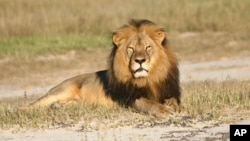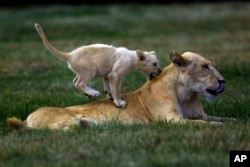The slaying of Cecil, a protected Zimbabwean lion, sparked outrage and debate around the world.
But on the annual celebration of World Lion Day, held August 10, animal rights campaigners are using Cecil’s story to illustrate what they say is a tragic truth: Cecil was one of the lucky ones.
During his 13-year life, the majestic black-maned Cecil roamed free in Zimbabwe’s Hwange National Park, running a pride and fathering eight cubs.
That sort of life was becoming increasingly rare in neighboring South Africa, said London-based advocacy group World Animal Protection. More than two-thirds of this nation’s lions live in captivity - the group estimates they number about 5,800, and the number is rising.
Cruel practices
Lions may look happy and cute, but Kate Nustedt, the group’s director of wildlife said that behind the scenes, their lives were miserable.
The organization said it has documented cruel practices at some facilities. Cubs are taken from their mothers early. Then they are typically punished using pain and fear to curb aggression. They are often kept in small enclosures and poorly fed. Additionally, campaigners said, constant human interaction stressed them out.
The organization also said they suspected - but could not prove - that some of the lions ended up in canned hunting facilities, where they could be killed for trophies.
“It’s the thin edge of a wedge of a very, very brutal industry,” Nustedt told VOA News from London. “It’s a big business around not only the hunting of lions but also the breeding of them, keeping them in captivity, being used in tourism. The lion parks where the cubs are captive and handled, they’ve doubled in size over the last 10 years, and it’s also believed that these lions are being used in what are called canned hunts that are being taken out after they’ve had a terrible life of abuse, and being shot in the way that Cecil was.”
But Scott Simpson, the manager of one of Johannesburg’s largest lion parks, the SA Lion Park, said not all facilities were guilty.
Simpson strenuously refuted that his organization sold its lions for hunting, and said the park kept meticulous records and welcomed scrutiny.
He said the facility treated its 48 lions humanely - but added he could’t speak for other lion parks.
“When it’s done properly, the animals, really they’re under no duress, they’re incredibly healthy, they’re well looked after,” he said. “We get audited regularly, so no, I think if it’s done properly, the animals are under no distress at all. I think there are probably a lot of fly-by-night sort of lion parks and wildlife parks that pop up, and the regulations there, I can’t speak for them, and I’m sure the animals aren’t always looked after. But when done properly with a well-trained team and animal behaviorists and vets on staff, then I really don’t see a problem with it.”
Lion parks
World Animal Protection does see a problem with the general concept, and says that tour operators should discourage lion parks, tourists should avoid them and governments should crack down on them.
And tourists, Nustedt said, also had a powerful role to play.
“We’re looking to build a global movement, because we’ve seen that so many people have been moved by what happened Cecil and we know at World Animal Protection that most people actually love animals and would never take part in any of these activities if they knew about the cruelties that are happening behind the scenes,” she said.
But whatever the circumstances, World Lion Day is a chance to assess the general plight of lions. According to the International Union for Conservation of Nature, the African lion population has fallen 42 percent in just two decades.
And so, on this World Lion Day, it’s clear that Cecil’s lifestyle -- that of a majestic beast freely roaming the African plains -- is slowly dying.












